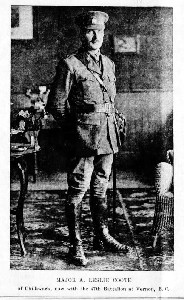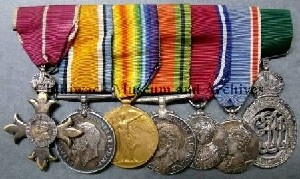
A. Leslie Coote

Courtesy of Chilliwack Museum and Archives
Jean Longstaff, with the assistance of Jim Busby in Canada, has submitted the following:
Born on 9th February 1869 to shipbuilder Arthur Coote and his Scottish born wife Janet (nee Macintosh), Andrew was their first son, born whilst they were living in Tynemouth. His sister Janet was born the following year, followed by Ada in 1875. After Ada’s birth the family moved to live at Broomfield Tower, Jesmond, a larger house that required seven servants, and the boys Arthur, Thomas and John were born there. It is likely that Andrew was sent away to boarding school as were his younger brothers, as there is no trace of him on the UK censuses for 1881 or 1891.
On 1st September 1892 Andrew married shipowner’s daughter Fanny Kirby in St. John’s Church, Newcastle and the couple then emigrated to Canada to start farming in British Columbia. By 1901 they had settled on their dairy farm in Chilliwack where their family consisted of children Hilda, Janet, Ian, Russell and Ada.
A farmer’s life wasn’t enough for Andrew. He organized the first Boy Scout troops in the Fraser Valley, was active in establishing local businesses, and organized various sports leagues, such as baseball, football and basketball, and was appointed Police Magistrate and Justice of the Peace in Chilliwack in the summer of 1913.
With an expansion of the Canadian militia a company of 60 officers and men was authorised to be based at Chilliwack as “D” Company of the 104th Regiment and in June 1911 Andrew was appointed as Lieutenant. Just over a year later, he was promoted to Captain and assigned the task of building a drill hall (still in use in the 21st century). In October he was appointed second in command of the 104th, and promoted to Major. When a second Chilliwack Company was authorized he had no trouble recruiting to full strength of 150 officers and men. On 5th August 1914, a notice appeared in the Chilliwack Progress newspaper advising all ranks to prepare their kit and personal affairs. The 104th was mobilized the next day, and the Chilliwack Companies were ready to depart for New Westminster within a few hours. Three weeks later part of the 104th (Westminster) Regiment left for Valcartier, Quebec, but without Major Coote, who was appointed Acting Commander of the remaining 104th, and moved the regiment across to Vancouver Island, a better location to train over the winter.
In February 1915, Major Coote was offered a staff position with the newly formed 47th Battalion and on 9th March was appointed Junior Major and Adjutant. The battalion spent the summer training at Camp Vernon, and at the end of October moved back to New Westminster where Coote was going to be assigned as an instructor. But the Major wanted to go to war, and although overage for overseas service and not in the best of health, on 4th November 1915 Andrew underwent a service medical and was declared fit. Three days later, he was with the 47th Battalion on the way to Montreal, then England on board the SS Missanabie arriving in Plymouth on 22nd November, and a posting to billets at Bramshott, Hampshire.
After attending a grenade course at Aldershot in March 1916 he was attached to 29th (Tobin’s Tigers) Battalion for a one month instructional “trench tour” in France, joining then at Dickebusch. Coote went up to the front at the first opportunity and, within a few days, was appointed as commander of “B” Company; at the same time he was appointed second in command of 47th Battalion and he returned to them in England at the end of May.
Returning to France with the 47th early in August 1916 as part of the 10th Infantry Brigade, 4th Canadian Division, he served all though the Somme campaign during autumn 1916, and took part in the assault that finally captured Regina Trench. Two weeks after returning from leave in England, Andrew reported sick with haemorrhoids and a hernia and was invalided back to England on 31st December 1916. Admitted to the Royal Free Hospital in London there was no treatment to be given so he was granted medical leave to be reviewed after four weeks.
One of the rules that governed an officer's status within a battalion was that he could not be inactive for more than four months, if gone for longer he would be struck off strength and would revert to waiting for a new assignment. Major Coote was granted convalescent leave twice, and was then declared to be suffering from neurasthenia for which his medical report read “his main trouble is nervousness, insomnia, headaches and bad dreams. He requires a long rest and quiet” so he was given leave for another month. Coote resigned his commission the same day his leave was extended and was discharged from the CEF on medical grounds on 30th March 1917.
Having spent some time with his wife Fanny and daughters Janet and Ada, who had returned to England and were staying in Jesmond, on 1st May 1917 Andrew Coote enlisted as Trooper 1953 in King Edward’s Horse, a cavalry unit of the British Army, and served with them in Ireland, Italy and France. Demobilised in London on 1st March 1919, the Major and his family returned to Canada at their own expense in September, sailing from Glasgow to Montreal on the SS Corsican. Spending some time on the east coast before returning home, on 30th October 1919, a notice appeared in the Chilliwack Progress inviting citizens to a public meeting for the purpose of organizing an appropriate homecoming for Major and Mrs Coote, demonstrating the high esteem he was held in at home, and through the intervention of Canadian Corps Commander Sir Arthur Currie, he was restored to the rank of Major in the CEF.
In December 1919 he was elected as President of the Chilliwack branch of the Great War Veterans’ Association and helped found the Royal Canadian Legion, becoming Honorary Life President of the Chilliwack Branch and also President of the New Westminster Branch. In 1920 he also stood, unsuccessfully, as a candidate in the British Columbia provincial election for Chilliwack.
On the reorganisation of the Canadian militia post war Major Coote was promoted to Lieutenant Colonel, and appointed CO of his old regiment, now known as the 3rd (47th CEF) Battalion, 1st BC Regiment, a post he held until the family moved to Vancouver in 1924. In 1923 he was awarded the Colonial Auxiliary Force's Officer's Decoration (Volunteer Decoration) recognizing twenty years of commissioned service in the Canadian militia. In 1926, he was appointed Brigade Major of the 23rd Infantry Brigade in Vancouver, a post he held until his enforced retirement aged 60 in 1929. During the Great Depression, he founded and supported the Warehouse on Commercial Drive in Vancouver, a place where out of work men could seek assistance.
Andrew and Fanny lived in Vancouver until the mid 30s when they moved back to England, possibly to help their son Ian set up his business, and the 1939 Register shows them living with their daughter Ada and her husband, the owner of the Hull Brewery, in Elloughton, near Beverley, East Yorkshire.
Three weeks before World War Two started, he volunteered for the RAF Observer Corps and within a short time was Head Observer for York Region based at Hull. Returning to Vancouver in 1942, he helped form a similar unit, the Aircraft Detection Unit, on the Canadian West Coast, being appointed Regional Director, and also formed, raised and ran the Pacific Coast Rangers, based on the UK's Home Guard, in Chilliwack. In 1946 Coote was awarded an OBE; announced in the London Gazette 1st January 1946 the citation records:
"On the outbreak of hostilities with Japan, Lieutenant-Colonel Coote was a Chief Observer with the Royal Observer Corps in England and he was also closely associated with the Home Guard Forces of the United Kingdom. Knowing the Pacific Coast and sensing the need for a similar "Home Guard" in Canada's west coastal area, he resigned from the Royal Observer Corps and returned to Canada. At that time the organization of the Pacific Coast Militia Rangers was just in its infancy and he was made an "organizer" and later Area Commandant, commencing duty on 21 April 1942. Since that date he has devoted all his time and energy to the Pacific Coast Militia Rangers and has been on duty daily in this unpaid employment. His work has been invaluable and the example he has set in his untiring effort and devotion to duty has been an inspiration to all. While not a wealthy man Lieutenant-Colonel Coote, in addition to giving unsparingly of his money in furthering the interests of his work. He has the respect and confidence of all those with whom he is in contact and his work reflects the highest degree of meritorious service. When the Pacific Coast Militia Rangers assisted the Aircraft Detection Corps, Western Air Command, in an extension of that Corps generally throughout the West Coast area, the work done by Lieutenant-Colonel Coote was given specific mention in a letter of appreciation from the Air Officer Commanding, Western Air Command as follows:- "Particular mention should be made of the very fine example of co-ordination of the two organizations which has been displayed in the lower Fraser Valley area through the efforts of Lieutenant-Colonel Coote."
He was presented with his medal by Viscount Alexander, the Governor General of Canada at the unveiling of Chilliwack War Memorial on 14th July 1946.
In 1947 he had a street named for him in Chilliwack, and in 1948, during serious flooding in the Fraser Valley, he organized a flood relief programme, including emergency housing. For this, he was awarded the Red Cross Badge of Service.
Fanny Coote died from dementia related illness on August 1961 in Vancouver and Andrew Leslie Coote died from bronchopneumonia in Shaughnessy General Hospital, Vancouver on 18th March 1965. Both Andrew and Fanny were cremated.
In December 2012 Andrew Coote’s medals were auctioned in Fakenham, Norfolk and were purchased by the Chilliwack Museum, where they are now on display.
Andrew Leslie Coote is remembered in Newcastle-upon-Tyne on NUT159

